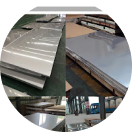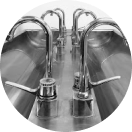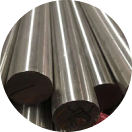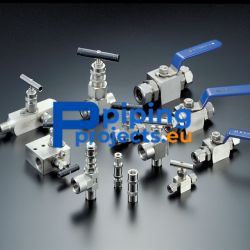PipingProjects.eu is one of the leading Instrumentation Valves Manufacturer in Europe. With advanced facilities and a team of skilled professionals, we seamlessly cater to the diverse needs of our clientele, providing bespoke solutions and unmatched expertise throughout Europe and its surrounding regions. As the foremost Instrumentation Valves Supplier in Europe, client satisfaction remains our primary focus. We adhere to exacting industry standards and continually innovate our manufacturing processes to surpass our client's expectations. Our unwavering commitment has firmly entrenched us as the preferred partner for piping endeavours across Europe's dynamic terrain.
A system that measures fluids has many valves. One of these valves is called the Instrumentation valve. It is important for safety and quality in the system. These valves are used for measuring, blocking, and releasing pressure. They are controlled by a machine to control the flow of fluid. This helps to control the quality of the process, like temperature and pressure, and how fast the fluid flows.

Does this product seem useful to you?
Reach out to us now for quick support.
Trusted
Supplier
Genuine
Product
Easy
purchase
Instrumentation Valves Specification Chart
| Particulars | Specification | |
|---|---|---|
| Size Range | 1/8 to 1 inch | |
| Operating Temperature | -20 to 232 degree | |
| Common Thread | BSPP, UNF, JIC, BSPT, METRIC | |
| Working Pressure | Upto 3000 psi | |
| Schedule | SCH5, SCH10, SCH20, SCH30, SCH40, Std, SCH80, XS, SCH60, SCH80, SCH120, SCH140, SCH160, XXS | |
| Grade | ||
| Stainless Steel | 200 Series - 201, 202, 205.
300 Series 301, 302, 303, 304, 304L, 308, 309, 309S, 310, 310S, 314, 316, 316L, 316TI, 317, 317L, 321, 347. 400 Series 405, 409, 429, 430, 430F, 430FSe, 434, 436, 442, 446, 403, 410, 414,416, 416Se, 420,420F, 422, 431, 440A, 440B, 440C. 500 Series - 501, 502. 600 Series - 630 (17-4 PH). |
|
| Carbon Steel | ASTM A106 Gr. A , B & C API 5L Gr. A / B, X42 ,X52 ,X60 ASTM A 53 Gr. A/B | |
| Titanium | Titanium 6-4, Gr 1, Gr 2, Gr 3, Gr 4, Gr 5, Gr 7, Gr 9, 5-2.5, 6-2-4-2, 6-4 ELI, 6-6-2. | |
| Hastelloy | C22, C276, X, B-2. | |
| Monel | 400, K500. | |
| Nickel Alloy | Nickel 200 Nickel 201, Alloy 20, Alloy 286, Alloy 218 (Nitronic 60), Nitronic 50 (XM-19). | |
| Cupro Nickel | Cu 90-10 (C70600,CW352H), Cu 70-30 (C71500, CW354H). | |
| Inconel | 601, 625, 660A, 718, X-750, 825, 925, 608. | |
| Duplex / Super Duplex | D S31803, D S32205, SD S32750, SD S32760, SD S32950. | |
| Chromium Molybdenum Steel | A387 Gr 2, A387 Gr 12, A387 Gr 11, A387 Gr 22, A387 Gr 22L, A387 Gr 7, A387 Gr 21, A387 Gr 21L, A387 Gr 9, A387 Gr 91. | |
| Nichrome Alloy | CrNi 20/80. | |
| Copper | ASTM B1, ASTM B2, ASTM B3, ASTM B152, ASTM B124, ASTM B133. | |
| Brass | Alloy 260, Alloy 272, Alloy 330, Alloy 353, Alloy 360, Alloy C48200 - C48500, Alloy 464. | |
| Bronze | Alloy 954, Alloy 933. | |
| Case Hardening Steels | 10C4, 15C8, 15Cr3, 16Mn5Cr4, 20MnCr5, 15Ni5Cr4Mo1, 15Ni5Cr4Mo2, 20Ni7Mo2, 20NiCrMo2, 14CrNi6. | |
| En Series | En8, En9, En19, En24, En30B, En31, En36, En45, En47, En48. | |
| Mild Steel | Sae 4118, Sae 4120, Sae 4120, Sae 4130, Sae 4135, Sae 4137, Sae 4140, Sae 4142, Sae 4145, Sae 4147, Sae 4150, Sae 4161, Sae 8620. | |
What Makes Us the Premier Instrumentation Valves Manufacturers in Europe?
As a trusted Instrumentation Valves Manufacturer in Europe, we follow strict quality control requirements to ensure the manufacturing of high-quality valves. Our accreditation demonstrates our experience in valve manufacture and ensures that our products satisfy industry standards. As a major global provider of valves made of various steel kinds, we specialize in manufacturing high-quality Instrumentation Valves. Furthermore, we provide a diversified selection of valves, including those made of different materials from recognized manufacturers such as ISMT and Jindal, to meet a wide range of industrial requirements.
We value dependability and accuracy as a top Instrumentation Valves Supplier in Europe. Our large collection includes a wide range of valves tailored to fulfill the different needs of our customers. With a strong dedication to quality and customer satisfaction, we strive to deliver seamless solutions to industries throughout Europe and beyond, assuring maximum performance and efficiency in all applications.
What are the Benefits of Utilizing a Mini Ball Valve?
The compact design of these valves obviates the necessity for lubrication, and their construction, featuring a Stainless steel float ball valve, affords a visual indication of flow, while remaining cost-effective. These valves are readily available in a variety of shapes, sizes, materials, and combinations. However, it should be noted that these Stainless steel sanitary ball valves do possess certain disadvantages, such as poor throttling characteristics. This is due to the fact that the valve seat is exposed to high velocity flow, which can result in rapid erosion of the Flow regulator ball valve. Additionally, the accumulation of trapped particles in the seat can lead to wear and tear, which may ultimately result in leakage of these Sanitary stainless steel ball valves. As such, they are not recommended for use in slurry applications.
Specification of High Pressure Ball Valve
As a trusted Instrumentation Valves Supplier in Europe, our High Pressure Ball Valves are available in different standards, grades, materials and specifications.
| Size Range | Flow Patterns | End Connections |
|---|---|---|
|
|
|
| Below listed High Pressure Ball Valve Suppliers also stock following brands | Types | Threads |
|
|
|
| Testing | Parts | List of projects where below listed High Pressure Ball Valve manufacturers has supplied |
|
|
|
| High pressure stainless steel ball valves types | Media temperature range | Standards |
|
-45 °C (-50 °F) to 121 °C (250 °F) |
|
| Pressure Rating | Media | Seal Types |
|
|
|
Advantages of Instrumentation Valves
PipingProjects.eu is a leading Instrumentation Valves Manufacturer in Europe. These are a few examples of Instrumentation Valves you can find at Piping Projects in Europe.
Applications of Instrumentation Valves






Instrumentation Valves Manufacturer in Europe

Instrumentation Valves Supplier in Europe
